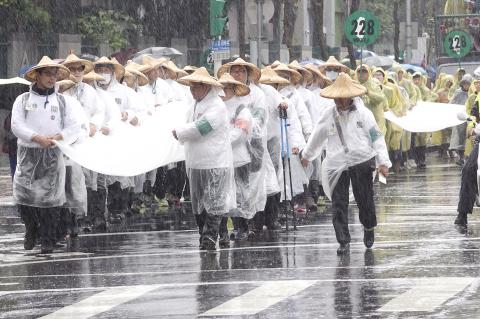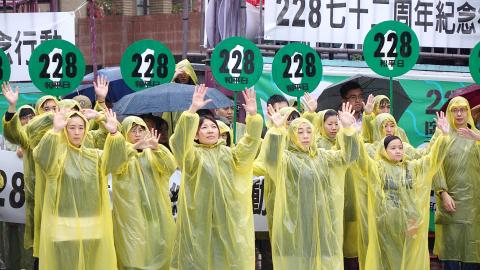Cold weather and steady rain did not deter hundreds of people from more than 60 civic groups who marched in downtown Taipei yesterday to commemorate the 72nd anniversary of the 228 Incident.
The groups, which included the 228 Memorial Foundation, the Presbyterian Church in Taiwan, the Nylon Cheng Liberty Foundation and the Taiwan Association for Human Rights, gave young leaders the spotlight by letting them lead the march.
“Let us be proud of Taiwan and our democracy,” marchers declared as they urged people not to forget the victims of atrocities and political oppression during the White Terror era.

Photo: George Tsorng, Taipei Times
The 228 Incident was a crackdown launched by the Chinese Nationalist Party (KMT) against civilian demonstrations following the indiscriminate killing of a bystander in an angry crowd in Taipei on Feb. 27, 1947; it is considered the start of the White Terror era.
During the march, teams of people held up white sheets, and walked in somber silence as though in a funeral procession, while audio recordings of the names of those killed during the massacre were played.
“The march started at the site of conflict that sparked the 228 Incident, the Tianma Tea House (天馬茶房), so that we could go back in time and uncover history and the truth of what took place, and transitional justice can be implemented,” Nylon Cheng Liberty Foundation executive Cheng Ching-hua (鄭清華) said.

Photo: George Tsorng, Taipei Times
Pastor Lin Wei-lien (林偉聯), of the Presbyterian Church’s church and society committee, said that the 228 Massacre left Taiwanese society in pain.
“We hold the march and related activities each year so that people do not forget, and to enable the different sectors of society to have more rational and open dialogues about this part of our history,” he said.
“This history must not be lost. We shall pass it onto the next generation, to become the common history and legacy of Taiwanese people,” he said.
“It is not just for the older generation — the younger generation must continue to commemorate the 228 Incident,” he added.
The young people picked to lead the march were all university students, including Chu Chen (朱震), Yu Teng-chieh (游騰傑), Hsu Kuang-tse (許冠澤), Liao Chung-lun (廖崇倫) and Cheng Shau-yun (鄭韶昀), who in 2015 organized nationwide protests over the then-KMT government’s plan to make high-school curriculum guidelines and textbooks more “China-centric.”
At the end of the march a prayer service was held and flowers were laid to commemorate the victims.
Participants gathered in front of the Executive Yuan, and Chu, representing the young people, read a statement.
“We believe that the phrase: ‘We are Taiwanese, not Chinese’ encapsulates the greatest common factor shared among people of our generation. We do not, and will never, consider Taiwan a part of China,” the statement said.
“We cannot remain silent and we cannot withhold our actions, because eventually we have to face the threat from China. What we can do is to hold each other by the hand. In this darkness, I feel as scared as you, but I will not let go of you,” it said.
“We will walk forward step by step, believing that we will soon see the light. Let us defend the values of democracy, let us be proud of Taiwan and our democracy,” the statement said.
“We hope that one day when we talk about the 228 Incident, we will no longer constrain ourselves to the peace declaration, history of oppression, or non-violent movements of intellectual elites. We may also recognize the bloody history of armed resistances of ordinary people,” it said.
“Let transitional justice enlighten the young generation. By inspecting the fabric of small things, let us feel the generosity and mercifulness of the subtropical island, and feel the scents of history, rivers and the ocean,” it said.
“From countless struggles of our ancestors, we understand the tradition of recalcitrance, and the character of bravery and perseverance embedded in Taiwanese people. Finally, in the battles of the real world, we will continue to be fearless,” it said.

CHAOS: Iranians took to the streets playing celebratory music after reports of Khamenei’s death on Saturday, while mourners also gathered in Tehran yesterday Iranian Supreme Leader Ayatollah Ali Khamenei was killed in a major attack on Iran launched by Israel and the US, throwing the future of the Islamic republic into doubt and raising the risk of regional instability. Iranian state television and the state-run IRNA news agency announced the 86-year-old’s death early yesterday. US President Donald Trump said it gave Iranians their “greatest chance” to “take back” their country. The announcements came after a joint US and Israeli aerial bombardment that targeted Iranian military and governmental sites. Trump said the “heavy and pinpoint bombing” would continue through the week or as long

TRUST: The KMT said it respected the US’ timing and considerations, and hoped it would continue to honor its commitments to helping Taiwan bolster its defenses and deterrence US President Donald Trump is delaying a multibillion-dollar arms sale to Taiwan to ensure his visit to Beijing is successful, a New York Times report said. The weapons sales package has stalled in the US Department of State, the report said, citing US officials it did not identify. The White House has told agencies not to push forward ahead of Trump’s meeting with Chinese President Xi Jinping (習近平), it said. The two last month held a phone call to discuss trade and geopolitical flashpoints ahead of the summit. Xi raised the Taiwan issue and urged the US to handle arms sales to

State-run CPC Corp, Taiwan (CPC, 台灣中油) yesterday said that it had confirmed on Saturday night with its liquefied natural gas (LNG) and crude oil suppliers that shipments are proceeding as scheduled and that domestic supplies remain unaffected. The CPC yesterday announced the gasoline and diesel prices will rise by NT$0.2 and NT$0.4 per liter, respectively, starting Monday, citing Middle East tensions and blizzards in the eastern United States. CPC also iterated it has been reducing the proportion of crude oil imports from the Middle East and diversifying its supply sources in the past few years in response to geopolitical risks, expanding

An Emirates flight from Dubai arrived at Taiwan Taoyuan International Airport yesterday afternoon, the first service of the airline since the US and Israel launched strikes against Iran on Saturday. Flight EK366 took off from the United Arab Emirates (UAE) at 3:51am yesterday and landed at 4:02pm before taxiing to the airport’s D6 gate at Terminal 2 at 4:08pm, data from the airport and FlightAware, a global flight tracking site, showed. Of the 501 passengers on the flight, 275 were Taiwanese, including 96 group tour travelers, the data showed. Tourism Administration Deputy Director-General Huang He-ting (黃荷婷) greeted Taiwanese passengers at the airport and